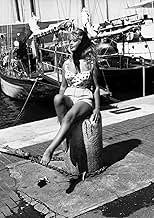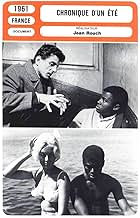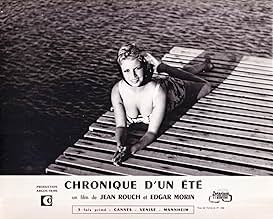AVALIAÇÃO DA IMDb
7,4/10
3,9 mil
SUA AVALIAÇÃO
Um documentário sobre a vida cotidiana de parisienses comuns, feito no estilo cinéma vérité.Um documentário sobre a vida cotidiana de parisienses comuns, feito no estilo cinéma vérité.Um documentário sobre a vida cotidiana de parisienses comuns, feito no estilo cinéma vérité.
- Prêmios
- 1 vitória no total
Marceline Loridan Ivens
- Self
- (as Marceline)
Marilù Parolini
- Self
- (as Mary Lou)
Jean-Pierre Sergent
- Self
- (as Jean-Pierre)
Jacques Gautrat
- Self - un ouvrier
- (as Jacques)
Régis Debray
- Self - un étudiant
- (as Régis)
Nadine Ballot
- Self
- (as Nadine)
Modeste Landry
- Self - un étudiant africain
- (as Landry)
Jacques Gabillon
- Self - un employé
- (as Jacques)
Simone Gabillon
- Self - une employée
- (as Simone)
Avaliações em destaque
"Chronicle of A Summer" invented the cinema verité movement, the idea being that by celebrating and revealing the artificial nature of the film-making process, the truth, or more accurately, some truths will emerge. The film is enveloped with a luminous and appealing humanism, and it is a very cool and cinematic portrait of Paris in the beat days. Remember that World War Two was only a decade or so before this and somehow the fog of that war hangs over the film, especially given the backstory of one of the participants, at least this is what I remember..As historic documents go, it is also amazingly compelling today. I find the film much more absorbing than "Salesman" or Drew Associates stuff. Drink espresso instead of a pint before the film, my friend and you'll be fine..
JB-81
PS If you want to watch paint dry, check out Melville- Although he's pretty great too..
JB-81
PS If you want to watch paint dry, check out Melville- Although he's pretty great too..
Jean Rouch is remembered as an oddity in film history, an artist working in between of fact and fiction as well as the era of colonialism and post-colonialism. He is especially often crowned as the founder of ethnographic cinema, but "Chronicle of a Summer" (1961) made by Rouch and Edgar Morin is something a little different. It is the breakthrough film of cinéma vérite or "truth cinema" which had a huge impact on the following French New Wave, most of whose filmmakers admired Rouch.
Already in his earliest documentaries, Rouch isolates himself from his own time by focusing on engagement and immersion instead of observation. Interaction between the observer and his object -- or rather between subjects -- becomes vital. As vital is embracing the presented subjects' personal and collective world views, which form a fascinating entirety in Rouch's "I, a Black Man" (1958). In a word, the other and the self are of the same reality to Rouch.
Although a representative of so-called truth cinema, Rouch and Morin's film does not concern any epistemic and scientific truth, but rather the truth of the appearance of the intersubjective reality. The camera takes part in action, ceases to exist, but at the same is inseparably present. A fabric of real emotions, thoughts, lies and acts is born which can be taken as a truth of one kind. On the one hand, Rouch and Morin attempt to revolutionize the cinema or at least to turn its lens to itself, but on the other, their sociological mission is to find out how does the modern man live. Hence they ask "Are you happy?" from random people in the streets.
Rouch's "The Human Pyramid" (1961) might be more well organized, though utterly poetic, than "Chronicle of a Summer", but the latter is more essay-like which also associates it with the new wave. The remarks of the meta-level are not as detached from the rest of the film as in "The Human Pyramid", but still fact and fiction merge in an essential fashion.
However, Rouch didn't only affect new wave filmmakers for his cinematic methods but also for his image of the world and man. There is indeed great human beauty in the film. During the interviews and other scenes, the camera becomes a penetrating mirror to whom one can reveal all of one's secrets. Perhaps this also happens to the viewer in a lesser extent. On one level, Rouch and Morin reveal the need to talk and share in an individualistic society. On the other, they tell something enduring about man, life and cinema.
Already in his earliest documentaries, Rouch isolates himself from his own time by focusing on engagement and immersion instead of observation. Interaction between the observer and his object -- or rather between subjects -- becomes vital. As vital is embracing the presented subjects' personal and collective world views, which form a fascinating entirety in Rouch's "I, a Black Man" (1958). In a word, the other and the self are of the same reality to Rouch.
Although a representative of so-called truth cinema, Rouch and Morin's film does not concern any epistemic and scientific truth, but rather the truth of the appearance of the intersubjective reality. The camera takes part in action, ceases to exist, but at the same is inseparably present. A fabric of real emotions, thoughts, lies and acts is born which can be taken as a truth of one kind. On the one hand, Rouch and Morin attempt to revolutionize the cinema or at least to turn its lens to itself, but on the other, their sociological mission is to find out how does the modern man live. Hence they ask "Are you happy?" from random people in the streets.
Rouch's "The Human Pyramid" (1961) might be more well organized, though utterly poetic, than "Chronicle of a Summer", but the latter is more essay-like which also associates it with the new wave. The remarks of the meta-level are not as detached from the rest of the film as in "The Human Pyramid", but still fact and fiction merge in an essential fashion.
However, Rouch didn't only affect new wave filmmakers for his cinematic methods but also for his image of the world and man. There is indeed great human beauty in the film. During the interviews and other scenes, the camera becomes a penetrating mirror to whom one can reveal all of one's secrets. Perhaps this also happens to the viewer in a lesser extent. On one level, Rouch and Morin reveal the need to talk and share in an individualistic society. On the other, they tell something enduring about man, life and cinema.
Often cited as one of the greatest documentaries ever made Jean Rouch and Edgar Morin's "Chronicles of a Summer" takes a look at the lives of of ordinary Parisiennes over the course of the summer of 1960. It was filmed in a 'cinema vertie' style, using the people who appear as if they were actors 'acting out' their lives. There is no voice-over; their technique is to use interviews or simply silently film these people going about their business. What distinguishes this extraordinary film from others of its kind is that this is a work both sociological and deeply political, a piece of social history in which Africans are side-lined and homosexuality never mentioned.
Rouch and Morin pick and choose their subjects, mostly workers, students and intellectuals, and back them into a corner where the politics of the proletariat becomes the benchmark. These people talk fearlessly about their treatment by the State and the drugery of their daily routine with white Parisiennes oblivious to their inherent racism.
The film-makers fundamental question is, 'Are you happy?' Initially two women interview people on the street asking them if they are happy and as the film progresses this becomes its focal point while the level of intimacy Rouch and Morin achieves is extraordinary. Theirs is a technique other film-makers have used many times since, perhaps more skillfully as film-making has become more sophisticated but this masterpiece remains the granddaddy of them all. Unmissable.
Rouch and Morin pick and choose their subjects, mostly workers, students and intellectuals, and back them into a corner where the politics of the proletariat becomes the benchmark. These people talk fearlessly about their treatment by the State and the drugery of their daily routine with white Parisiennes oblivious to their inherent racism.
The film-makers fundamental question is, 'Are you happy?' Initially two women interview people on the street asking them if they are happy and as the film progresses this becomes its focal point while the level of intimacy Rouch and Morin achieves is extraordinary. Theirs is a technique other film-makers have used many times since, perhaps more skillfully as film-making has become more sophisticated but this masterpiece remains the granddaddy of them all. Unmissable.
Some really fascinating stuff pops up in here with pertinent questions that make you wonder how much was real vs performance. Overall a neat look at 1960 Paris that holds time capsule like qualities and the keys to shared traits cross generations.
By 1960 the documentary had evolved with new sound equipment and lighter cameras. In a direct line from the ideas of Flaherty and Vertov, Canadian filmmakers as Michel Brault had made significant shorts as "Les raquetteurs" (1959), while in the United States Robert Drew created his seminal work, "Primary" (1960.) All this activity helped the launching of "cinéma vérité" in France, with this film manifesto made by anthropologist Jean Rouch and sociologist Edgar Morin. With a "caméra vivant" (living camera) and the question "Are you happy?", they went out to the streets of Paris to make a survey, showing passages in the life of students, workers and migrants (including Joris Ivens' future wife), with a short escapade to the St. Tropez beach, and a final confrontation of the creators and subjects with the footage and the idea of constructing objective pieces of reality on film. Rouch and American Frederick Wiseman believed in a kind of documentary open to emotional spaces and fantasy (as opposed, for example, to Richard Leacock's more naturalistic approach), and eventually changed the tone of their works, while the movement finally identified with the concept of "direct cinéma", developed by Canadians and American filmmakers.
Você sabia?
- CuriosidadesThe 6th greatest documentary of all time according to the 'Sight & Sound' poll 2014. The list was compiled after polling from over 200 critics and curators and 100 filmmakers.
- Citações
Sophie - the cover-girl: People are bored everywhere now. But boredom comes from within. If you've got an inner life, you're never bored.
- ConexõesFeatured in Les échos du cinéma: Episode #1.23 (1961)
Principais escolhas
Faça login para avaliar e ver a lista de recomendações personalizadas
- How long is Chronicle of a Summer?Fornecido pela Alexa
Detalhes
- Tempo de duração
- 1 h 25 min(85 min)
- Cor
- Mixagem de som
- Proporção
- 1.37 : 1
Contribua para esta página
Sugerir uma alteração ou adicionar conteúdo ausente






























